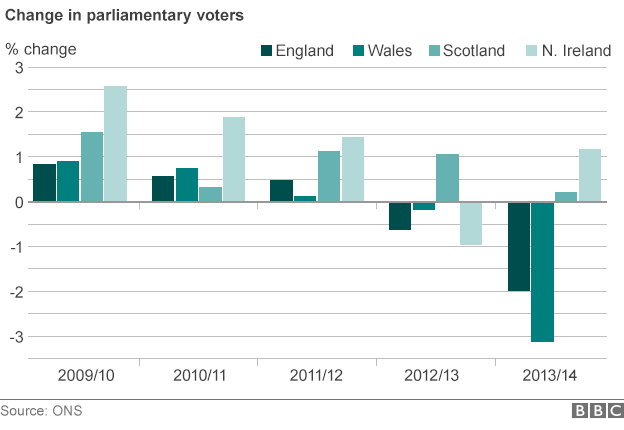Reality Check: Has the number of voters fallen?
- Published

Today is your last chance to register to vote in the general election on 7 May.
The deadline is midnight tonight and there are details of how to register here on the BBC News website.
On Friday, the Office for National Statistics (ONS) published figures, external for the number of people registered to vote in parliamentary elections.
It turns out that as of December 2014, there were 45,325,100 people registered to vote in the UK, which was down 1.8% on the previous year.
There are two reasons why this figure may not give the full picture. The first is that that number has probably risen since December. It would be reasonable to assume that an approaching general election would focus people's minds on whether they are eligible to vote.
The second is that the rules about how you register to vote changed last year. Instead of somebody from a household registering everybody in that household to vote, all individuals are now responsible for their own registration.
The change was made in England and Wales in June and in Scotland in September after the referendum. Northern Ireland has had individual registration since 2002.
The group most affected has been students. Previously, a university could just give a list of eligible voters to the local authority. Now all students have to register themselves.
The effect of this may be seen by looking at which constituencies have seen the biggest falls in voter numbers. The ONS points out that all of the top 10 contain towns or cities with large student populations. It is led by Cardiff Central, which has seen an 18% fall in voter numbers, followed by Liverpool Riverside at 15% and Newcastle upon Tyne East at 14%.
Looking at the constituent countries of the UK, Scotland and Northern Ireland have seen rises in voter numbers, which may be due to Northern Ireland having had individual registration for some time and Scottish registrations being boosted by the referendum.
A number you may have heard being used is that there are 7.5 million UK voters who are eligible to vote but who have not registered.
That is an estimate from the Electoral Commission, external and, at first glance, it is hard to see how it can be right. In the middle of 2013, which is the most recent figure available from the ONS, the UK population over the age of 18 was about 50.5 million, which is only about five million above the number of registered voters, and of course not all those people would be eligible to vote in a parliamentary election. We know from the ONS that about 1.5 million of them are registered to vote in local elections but not parliamentary ones.
But the Electoral Commission is not just talking about the gap between the numbers eligible to vote and the number who have registered. It is also talking about the people who are registered but not at the correct address, so it may include people who have moved house and not registered themselves at their new address. They would still appear among the people registered to vote but may struggle to do so.
An interesting question is whether the people who have not registered to vote under the new system are people who would not have bothered to vote anyway.
If that is the case, some commentators have pointed to the possibility that while the 2015 election might see a fall in the number of people voting, it could also see a rise in the percentage turnout.

Election 2015 - Reality Check

What's the truth behind the politicians' claims on the campaign trail? Our experts investigate the facts, and wider stories, behind the soundbites.
Read latest updates or follow us on Twitter @BBCRealityCheck, external
